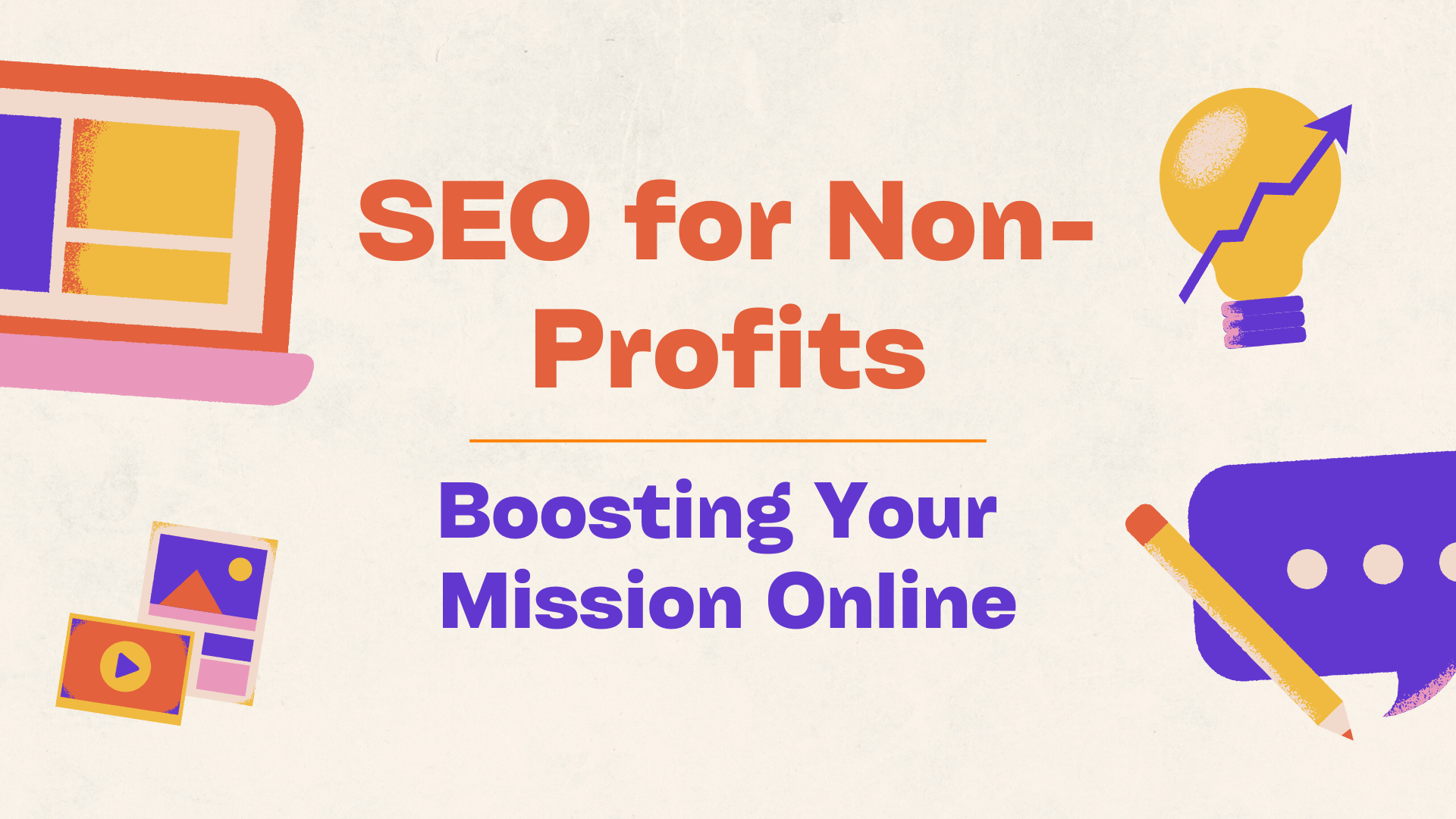Non-profits often struggle to be noticed online. This is where Search Engine Optimization (SEO) becomes an important tool. SEO helps your website show up higher in search results. This, in turn, makes it easier for people to find you when they look for information related to your cause.
For non-profits, good SEO means reaching more potential supporters without spending a fortune on ads. When someone searches for topics connected to your mission, you want your organization to appear in the results. This visibility can help generate qualified leads to help get more donations, volunteers, and overall support for your cause.
Your website is often the first impression people get of your non-profit. By improving your SEO, you’re not just climbing search rankings – you’re making noise and increasing the likelihood that people will hear you and engage with your mission.
SEO can help ensure that people who care about these issues can find and support your work, whether you’re fighting for environmental protection, advocating for social justice, or supporting local communities.
What are search engines, and how do they work?
Search engines are complex tools designed to help people find information quickly. When you type a question or phrase into Google, Bing, or another search engine, it combs the entire Internet to find the most relevant answers. For non-profits, understanding how these systems work is key to getting their message out.
Search engines do three main things:
- They crawl the web, following links from page to page.
- They index the content, organizing it based on topics and relevance.
- They rank web pages, deciding which ones to show for each search query.
This process matters for non-profits because it determines whether your website appears when someone searches for topics related to your cause. If a potential donor searches for “charities fighting hunger in [your city],” you want your food bank to appear in those results.
But why is this visibility so important? Many people turn to search engines to learn about a cause, find volunteer opportunities, or make donations. If your non-profit isn’t showing up then, you’re missing out on connecting with people who are actively looking to support causes like yours.
Good SEO practices help search engines understand what your non-profit does and why it’s relevant to searchers. This understanding translates into better visibility, leading to more support for your mission.
Your non-profit needs to be visible online, whether
- you’re trying to attract volunteers
- increase donations, or
- spread awareness about your cause
SEO Fundamentals: Crafting a Strategy That Resonates
SEO isn’t just about fiddling with your website to please search engines. It’s about developing an online presence that represents your mission and answers questions for the people you’re trying to reach.
Think of SEO as building a bridge between your organization and the people who need your services or want to support your cause.
This bridge has two main parts:
- Content: What your website says (Including all the text, images, and videos.)
- Technical aspects: How your website is built and organized. (This is all of the behind-the-scenes stuff like meta descriptions and alt text.)
When crafting your SEO strategy, focus on:
- Figuring out your audience:
- Who are you trying to reach? What are they searching for?
- Creating valuable content:
- Share stories about your impact, explain your programs, and offer resources related to your cause.
- Using relevant keywords:
- People use these words and phrases when searching for topics related to your work.
- Improving your website’s structure:
- Make it easy for visitors to navigate your site. This will, in turn, make it easier for search engines to identify your site’s purpose.
- Quality trumps quantity.
- It’s better to have a few well-written, informative pages than dozens of low-quality ones.
- Search engines are getting better at recognizing content that is actually helpful. Focus on creating genuine value for your visitors.
- A good SEO strategy evolves.
- Keep an eye on which pages are performing well and which aren’t. Use this information to refine your approach over time. Are people staying longer on certain pages? Do some topics get more engagement? Take this information and use it to guide your work.
“On-Page” SEO: Optimizing Your Digital Home
On-page SEO refers to the work you do on your website to improve its search engine rankings. For non-profits, this is about making your digital home as welcoming and informative as possible, both for visitors and search engines.
Here are key areas to focus on:
Content Creation
Create content about your programs, share success stories, and provide resources related to your cause. You should use keywords throughout your content. But, you should do so naturally while focusing on terms your audience is likely to search for.
For example, if you run a youth mentoring program, you might use phrases like “volunteer mentoring opportunities” or “youth support programs in [your city].”
Page Titles and Descriptions
Each page should have a unique, descriptive title tag and meta description. These appear in search results and are your first chance to grab someone’s attention. Make them clear and compelling.
For example:
Title: “Volunteer Mentoring Program – [Your Non-profit Name]”
Description: “Make a difference in a young person’s life. Join our volunteer mentoring program and help shape the future of [Your City]’s youth.”
Headers and Structure
Use header tags (H1, H2, H3) to organize your content like an outline. This will help your readers and search engines understand what your website is about.
Images and Accessibility
Everyone knows to include images to break up text and illustrate your points in articles. But, it is just as important to add alt text to images, describing what they show.
This helps with accessibility for visually impaired users and gives search engines more context about your content.
Internal Linking
Link to other pages on your site. This helps visitors find more information and helps search engines understand how your content is related. For example, your page about volunteering might link to specific program pages or to volunteer sign-up forms.
Mobile Optimization
Many people will access your site on phones or tablets, and search engines prioritize mobile-friendly sites. This makes it very important to ensure your site looks good and functions well on mobile devices.
By focusing on these on-page SEO elements, you’re not just improving your search rankings – you’re creating a better, more useful website for the people you’re trying to reach. Remember, every improvement you make is a step toward better serving your community and advancing your mission.
Off-Page SEO: Expanding Your Digital Footprint
“Off-page SEO” is all the work you do outside of your own website that can impact your rankings within search engines. For non-profits, this is about building your reputation and authority across the internet.
Here are key areas to focus on:
Backlinks
Backlinks, or links from other websites to yours, are like votes of confidence for your non-profit. Search engines look at those links as evidence that your work is valuable and providing trustworthy content.
Focus on earning backlinks from reputable sources in your field. You can do this by:
- Partnering with other organizations and cross-linking to each other’s resources
- Getting listed in relevant non-profit directories
- Creating shareable content that others want to link to, like infographics or research reports
- Contributing guest posts to blogs that cover your area of expertise
- Appearing on podcasts in exchange for a link to your website.
Remember, it’s quality over quantity. A few links from respected organizations in your field are worth more than multiple random links from unrelated or low-quality sites.
Social Media Engagement
While social media signals aren’t direct ranking factors, a strong social media presence can indirectly boost your SEO.
Use social platforms to:
- Share your content and drive traffic to your website
- Engage with your community, which can lead to more shares and potential backlinks
- Increase brand awareness, which can lead to more branded searches for your non-profit
Online Mentions and PR
It is important to get bank links, but other organizations can even help your SEO efforts by mentioning your site without a link.
This could include:
- Press coverage about your initiatives or impact
- Interviews with your organization’s leaders
- Features in articles related to your cause
To increase your chances of being mentioned, consider:
- Sending out press releases about significant events or milestones
- Engaging with journalists and bloggers in your field on social media
Local Citations
Make sure your organization is listed in local directories and review sites if your non-profit serves a specific geographic area.
Consistency is key, so make sure your name, address, and phone number are all the same wherever you are listed.
Remember, off-page SEO is about becoming a trusted, authoritative voice in your field. This is important because it helps with SEO and increases your non-profit’s overall impact and reach.
As a non-profit, your mission gives you a unique advantage in creating meaningful, impactful content. Use that strength to guide your SEO efforts, and you’ll be well-positioned to adapt to whatever comes.
If you need any help with your SEO work, reach out to set up a consultation.


